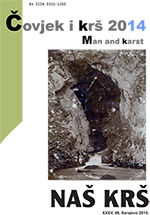ODNOS ČOVJEKA I VODE NA ISTARSKOM KRASU KROZ POVIJEST
THE MAN AND WATER RELATIONSHIP IN THE ISTRIAN KARST THROUGH HISTORY
Author(s): Tamara Crnko, Josip RubinićSubject(s): Cultural history, Human Geography, Regional Geography, Environmental Geography, Ethnohistory, Local History / Microhistory, Social history
Published by: Centar za krš i speleologiju
Keywords: water resources;karst;protection;water supply
Summary/Abstract: The characteristics of karst relief of Northern Istria have significantly influenced human attitude towards water. It is an area with the so-called binary structure of hydrographic network with changing underground and surface regimen of water flow in a single river basin. Water leaks through soluble dolomites and limestone, while flysch layers slow underground drainage thus allowing formation of large surface water basins such as the River Mirna. Water was and is of great significance for the life of inhabitants of the karst area of Buzet characterized by scarce vegetation and karst relief forms. Water supply of the area was organised and designed over many years. Rural population was supplied with water in different ways through history, integrating the importance of water into their cultural identity, myths and legends.The paper focuses on the basic water use and water storage models through history, from the usage of water tanks and water mills to the development of organised water supply system such as the Water Utility of Istria. Human activities, such as amelioration and regulation, afforestation, and water usage in agriculture, had significant impact on contemporary landscape of Northern Istria. Although the water supply system of the Buzet area is organised and modernised with only a small number of the population without access to water supplied by utilities, and traditional ways of water supplies are disappearing, concerns about water are present and integrated in culture. Depopulation of the Istrian rural region has affected the landscape, water resources and water resource protection of karst water basins. Due to lower pressures, depopulation has accidentally had positive effects on the water quality. However, it is not a model to rely on in the future. Implementation of measures and awareness-raising is essential for water protection in the area. A dynamic relationship between people and water embedded in cultural consciousness is particularly important. Each period brings new challenges and solutions in water protection measures, but also significant risks if these measures are not implemented in a thoughtful manner.
Journal: Naš krš
- Issue Year: XXXV/2015
- Issue No: 48
- Page Range: 78-90
- Page Count: 13
- Language: Croatian

